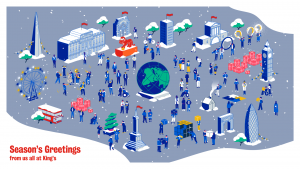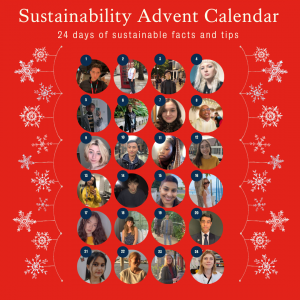If you are celebrating Christmas this year, then it is important to be conscious about the impact of different activities and how you can make them more sustainable – while remaining equally enjoyable (or even more enjoyable knowing that you’re making a difference!). If you do not celebrate Christmas, then these are still relevant points to consider outside of these traditions.
Gifts
For many people, Christmas and gifts go hand in hand. However, we know that overconsumption can be an issue for the finite resources on our planet. Our key tip is not necessarily to skip giving gifts altogether, but rather to think carefully about what you buy or give.
Buy from businesses that put sustainability and ethics at the forefront
Ethical Consumer is an amazing website and magazine which helps to cut out the noise and gives you information on which businesses have been naughty or nice this year. They cover everything from high street clothing retailers, bookshops, health and beauty products, to which are the most ethical supermarkets. The Living Wage Foundation has also compiled a great Living Wage Gift Guide for 2021.
The pandemic has had a devastating effect on small businesses. Therefore, if you can, it is more important than ever to support your small, local businesses. You could also consider buying from charities, and do not forget the impact of deliveries if you are planning to shop online.
Do you need more inspiration? Then check out this blog post with tips for gifts for foodies, gifts around health and wellbeing, homemade gifts, sustainable tools… Read more about sustainable and ethical Christmas shopping here.
Non-physical gifts
If you want to cut the consumerism of Christmas back – why not use the money you would have spent on presents for a day out with your loved ones instead? Or offering your amazing babysitting skills to a sibling with young children, might be their favourite present yet!
For a gift that makes a difference, you could also consider giving to charity in someone’s name.
Wrapping paper
Gifts bring us to the next topic: wrapping paper. Wrapping paper can often not be recycled, and we throw away over 100 million rolls every Christmas!
If you do have a physical gift to wrap, consider ditching non-recyclable shiny wrapping paper for more environmentally-friendly options. This can be wrapping paper made from recycled materials such as ‘ReWrapped‘, a box you can re-use, or something homemade. Even if you are not the most talented crafter out there, websites like Pinterest have hundreds of ideas for DIY gift wrap. Gift bags such as this one are also great – as they can continuously be reused and save you lots of wrapping up time! If you receive a large gift – save the wrapping paper from it and use it for next year when you’re wrapping up future gifts.
Food
One of people’s favourite elements around Christmas is food. There is a lot you can do to have the most delicious meals during this festive season while being eco-friendly.
Vegan/vegetarian
This includes trying some vegan or vegetarian dishes. 51% of global greenhouse gases come from animal agriculture, therefore going plant-based is a powerful action we can take to reduce our contribution to climate change.
This recipe video by Bosh! makes a vegan Christmas dinner including a portobello mushroom wellington, maple roasted veggies, balsamic sprouts, wholegrain mustard mash and the perfect roast potatoes, which show that going meat-free doesn’t mean missing out on a tasty dinner.
Avante Garde Vegan has an alternative wellington recipe here. While also providing a bounty of other plant-based recipes, such as Christmas pudding, Yorkshire puddings and spiced hot chocolate.
Buy your products carefully
Besides, think about buying local, seasonal, and organic products, and avoiding products with unsustainable palm oil… Try purchasing your products packaging-free to reduce waste as well! Read more about Christmas & sustainable food here.
Cut down on food waste
That brings us to the topic of food waste, which is responsible for about 6% of global greenhouse gas emissions. Good planning is the first step, but leftovers are often unavoidable. Think about freezing your delicious meals to enjoy at a later date. Or put them on Olio: it’s a great way to make sure your food doesn’t go to waste because plenty of other people might be keen to have it.
Travel
Although travelling continues to be more complicated this year, the festive season is known for travelling – whether it’s on a trip or to go back home. You’ve probably already made your plans for this year, but think about how you’re travelling and if you could opt for a more sustainable option. Good to keep in mind for your next travels too!
Flying significantly increases your carbon footprint. Flying economy class to Cape Town or the Dominican Republic emits over 3 tonnes of CO2 – which is the same amount emitted by felling 4 acres of rainforest. If you’re travelling to Europe, try using the train. Or experience the UK Christmas traditions one year!
The tree
What is more sustainable: an artificial or real tree? If you can get a second hand one, fake. You can find these from sites such as eBay, Gumtree or Freecycle. However, according to the Carbon Trust, a 6.5ft artificial tree is responsible for about 40kg of greenhouse gas emissions – which means you need to reuse it for about 10 Christmases to keep its environmental impact lower than buying a real tree every year, depending on the materials used in the fake tree. Therefore, if a second-hand artificial tree is not an option, real trees are the more sustainable option.
If you’re buying a real tree, make sure yours is grown using sustainable practices. For example, try to get a tree that is registered with the British Christmas Tree Growers’ Association, where trees are grown according to strict guidelines (for example, being required to use sustainable seeds to protect local wildlife). Read more about how to pick your tree here.
Once Christmas is over, you can contact the council who can collect your tree in January and shred it into chipping or use it for compost. Check your council pick-up dates here.
Energy
Remember to switch off for the Christmas period: turn off all lights and non-essential equipment at the plug if you are the last one to leave your office/residence. It’s important to turn appliances off at the plug as even when they are switched off, some devices will continue to use electricity while they are plugged in, known as ‘vampire power’. A common culprit is mobile phone chargers – they will continue to use energy when plugged in, even if there is no phone connected to them.
Check out what to think about when switching off here.
Another tip is to try to keep your thermostat low. Rather than putting your heating on high during the colder winter months, lower your temperature gauge and use it as an excuse to wear a Christmas jumper instead.
We hope these tips give you some inspiration on how to make Christmas more sustainable!
Check out some past blog post on this topic here:



